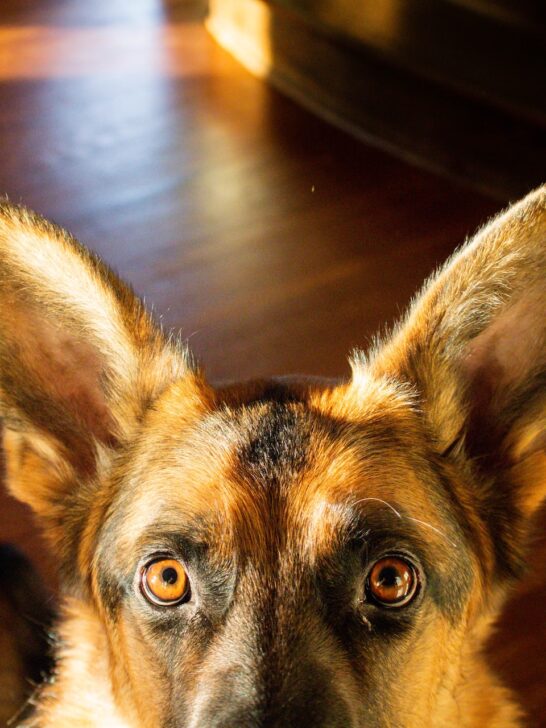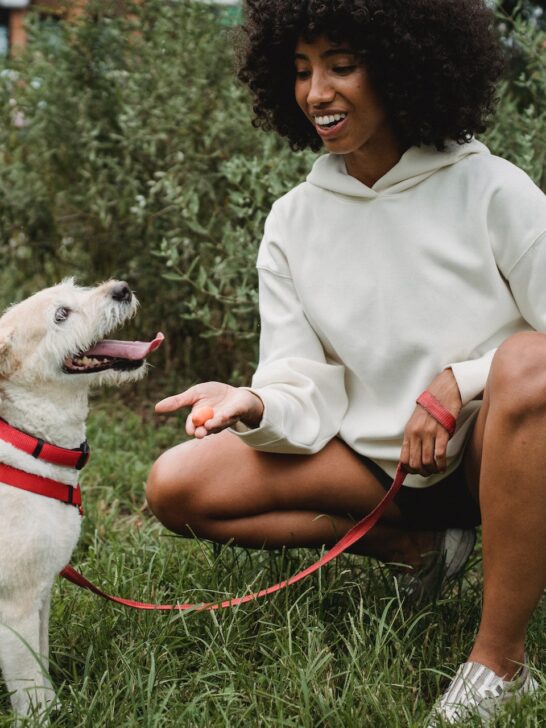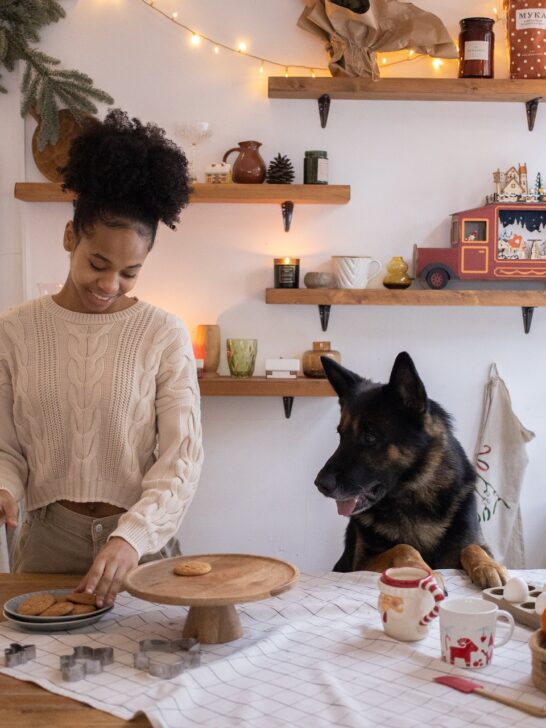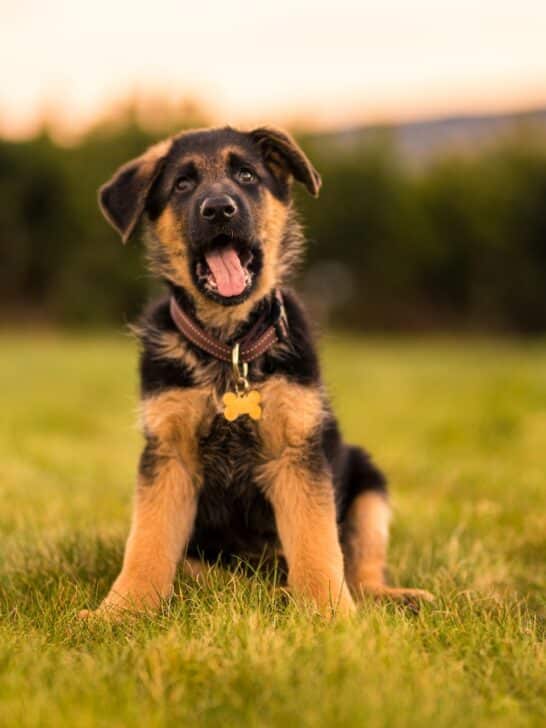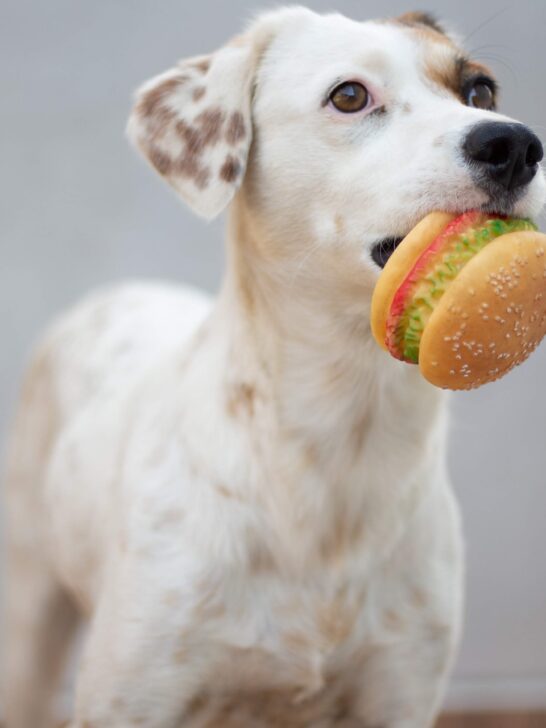A Guide On How To Care For Your Pregnant Dog
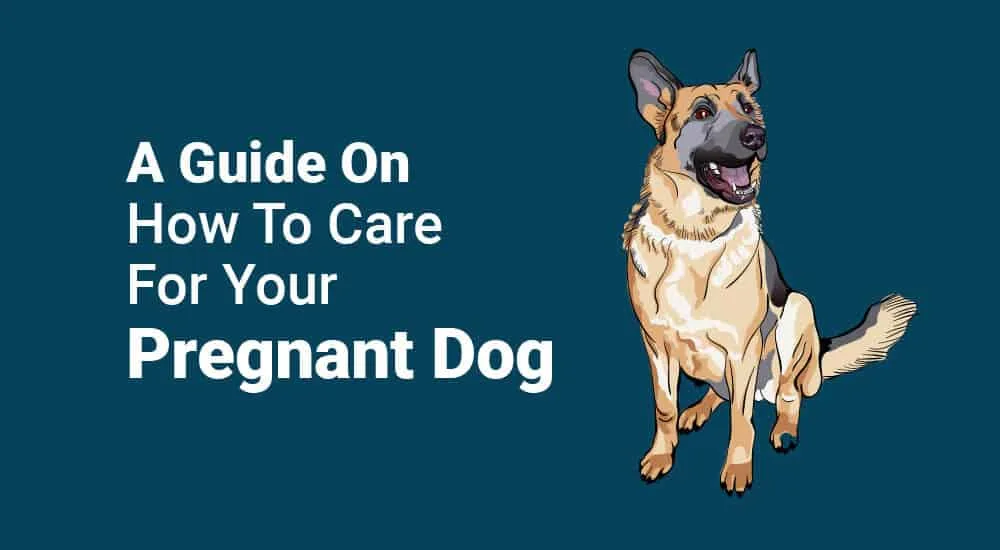
Introduction

There are very few joys in life that are greater than having a dog. They can bring you so much happiness, and can make a huge imprint on your life. But what’s better than one dog? That’s right – multiple!
Congratulations – your dog is pregnant! Pretty soon there are going to be even more paws pitter pattering around your house.
Of course, if you want both mom and babies to be healthy, then you need to be making sure that you are taking good care of the mother while she is pregnant.
Now, it can sometimes be hard to know even the first thing about how to care for your pregnant dog. As such, it’s rather overwhelming!
Thankfully, we’re here with all of the answers that you need to make sure that your dog has a smooth pregnancy. Read on for more info!
The Importance of Caring For Pregnant Dogs

It’s always important to take care of your beloved pet, but you need to be extra careful with pregnant dogs.
This could be a difficult and uncomfortable time for your dog, so you should be doing everything that you can in order to keep them happy throughout their pregnancy.
Dogs are usually pregnant for between 58 and 68 days, and this is divided into trimesters.
Though this isn’t as long as a human pregnancy, it’s still important to ensure that they are well cared for during that time. You wouldn’t just leave a pregnant woman to fend for herself, would you?
Well, the same goes for caring for your pregnant dog. Ultimately, if your dog is happy then you likely will be too!
If your dog is well cared for and happy throughout her pregnancy, it comes with a higher likelihood that the puppies will also be happy and healthy.
Caring for your dog begins with understanding how to tell that they are pregnant. You may notice certain symptoms before their first ultrasound.
For instance, your dog may not be as active as usual. They may be more tired and lethargic. You may also find that they are behaving differently and their appetite has changed.
Other signs include weight gain and a larger looking abdomen, signs of nesting and larger, different colored nipples.
Once you know that your dog is pregnant, congratulations! Now it’s time to ensure that you are taking care of your precious pooch so that their pregnancy is smooth sailing.
Read more on caring for your German Shepherd Dog in heat.
Steps For Ensuring Your Dog Is Cared For While Pregnant
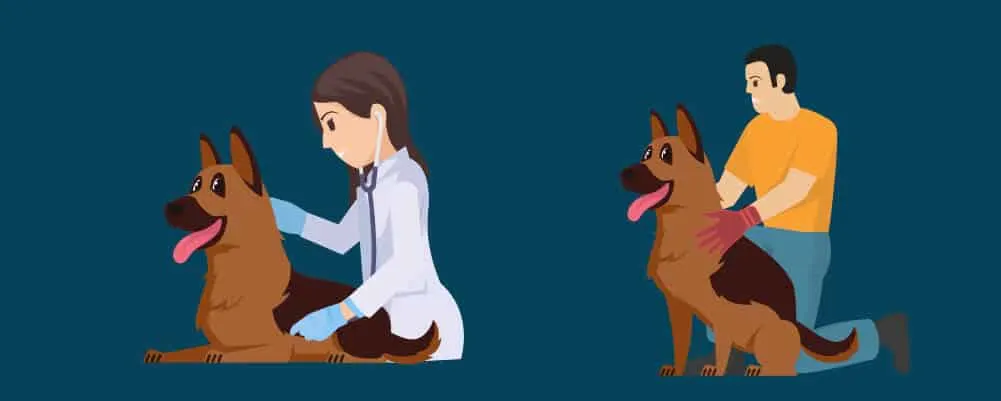
The main piece of advice that we can give when it comes to caring for your dog during her pregnancy is to do your research.
Make sure that you speak to your vet about the key things that you need to know during your pet’s pregnancy, as this will help you to look out for any warning signs and will help you to ensure that they are well looked after.
The first thing that you need to do is confirm the pregnancy. You can do an ultrasound on the 25th day of the pregnancy, and these will confirm whether your dog is pregnant or not.
While you are at the veterinary practice, your doctor will likely give you some guidance about how to look after your dog during their pregnancy but they may not be able to go in depth with you in a short appointment time.
Read everything that you can about how to care for your dog. You will likely find that it is broken down into the things that we have listed below.
You will need to ensure that you purchase the correct food for your dog and her growing puppies.
Make sure that you are giving them the right level of exercise. Know everything you can about dog vaccinations – are they safe for pregnant dogs?
You should also take the time to ensure that your dog is protected against worms and parasites, and make their space as comfortable as possible and ready for the birth.
So, how do you take care of your pregnant dog? Here are all of the steps broken down.
Nutrition

So here’s the first question that many people ask when it comes to feeding your dog during pregnancy. Is it necessary to alter the diet of the pregnant dog?
It should come as no surprise that nutrition is crucial when your dog is pregnant.
Your dog’s nutritional requirements are going to increase slightly when they are in the final trimester of their pregnancy, but it’s important to ensure that they are given the right nutrition throughout the pregnancy and beyond because the nutritional deficiencies are far more likely to happen after they have given birth.
Ultimately, you need to be giving your dog adequate nutrition so their weight is increasing by around 15 to 20 percent by the time they start whelping.
So what exactly does your dog need to be eating?
The Beginning of the Pregnancy
As we mentioned previously, your dog will be pregnant for around 63 days in total, though this can depend on the breed size.
During the beginning 4 to 5 weeks of the pregnancy, it’s only necessary to be giving your dog the food that they usually eat.
This food should be full of the nutrients that an adult dog should be eating, so it should be a mixture of carbohydrates, proteins, fats, vitamins and minerals.
Look for a dog food that has the right balance of all of these. In wet food, the dog food should consist of 5.5-8% protein and 3-5% fat. For dry food, it should be 22-30% protein and 10-16% fat.
You should already know how much your dog should be eating on a regular basis, but if you are confused at all then speak to your vet or have a look at the references on the dog food that you have bought.
Earlier on, we also mentioned that your dog’s appetite changes during pregnancy. Well, this doesn’t only apply to what your dog eats. When your dog is pregnant, they are more likely to drink more water.
For this reason, you should make sure that your dog has plenty of water available to them so that they can stay hydrated throughout the day.
Since your dog is also going to be rather lethargic at this point, keeping the water bowl close to your dog is a good idea.
The Last Few Weeks
When it comes to the last couple of weeks before your dog is ready to give birth, you will need to change the diet a little.
Ideally, your dog needs to be getting around 30-50% more calories than what she had previously, though this depends on the number of puppies that your dog is going to be birthing.
If you are confused in any way, speak to your vet for any guidance.
During this time period, your dog is going to have a 15-30% increase in weight – this is perfectly normal and nothing to be alarmed about.
It’s mainly because the body weight is increased and from the weight of the puppies.
The chances are that you’re not going to need to give your dog any additional supplements during their pregnancy so long as the food that you are giving them is of a high quality.
It’s worth looking for foods that are fortified with fatty acids too, known as EPA and DHA. Try to find foods that have fish oil in the ingredients list as this will help you to ensure that your dog is getting enough fatty acids in their diet.
Whelping and Beyond
You will likely find that your dog doesn’t eat in the 12 to 24 hours before they start whelping. It’s best not to try and make her eat at this time, but give them plenty of fresh water so that they are hydrated.
After they have given birth, your dog will need to change their diet while they are nursing.
It’s best to give them either active pet food or some high quality puppy food, as these foods have the protein and fat balance that is best for your dog’s current needs.
Using a free feeding method can also help. Not only that, but you should be increasing her intake by 25% for each puppy that she has.
In some cases, she may even need to have a 200% increase in her calorie intake.
Exercising your dog during her pregnancy

Nutrition is just one side of the equation for your dog while they are pregnant. What about exercise? It’s perfectly fine to walk your dog during pregnancy – in fact, it’s even encouraged.
Usually though, you need to ensure that your dog is having as little strenuous activity as possible during the later points of her pregnancy. Let’s break that down.
Walking Your Dog During Her Pregnancy
Your dog needs exercise, sure, but you need to be extra cautious when taking your dog for walks when they are pregnant. They are a little more fragile since they have lots of little lives inside of them!
For this reason, you should take some precautions when you are walking your dog.
- First of all, you should try to walk your dog at a different time than when you would walk your other dogs. Dogs aren’t like humans – they don’t entirely understand how pregnancy works. This means that they may try to play with your pregnant pooch, potentially in a rough manner. This could potentially cause some damage to your pregnant dogs and the puppies inside of her. If you keep your dog away from others, then there’s a much lower likelihood that the mother could get hurt and end up picking up diseases. Keep everything calm around your pregnant dog and that will give you the best results.
- When your dog is pregnant, it may also be a good idea to change up your walking route a little bit. For instance, if there are any hills on your usual walking route then you may want to find something on flatter ground. You don’t want to unnecessarily put any strain on your dog when she is pregnant. Stay away from any routes that may over excite your dog too.
- Another thing to remember when you are walking your dog is to keep it slow. This is not the time to take your dog jogging with you. Instead, go for a leisurely walk. Ideally the walk should also be shorter since they are more likely to become tired on walks that are particularly long.
- The single most important thing to do when you are exercising a pregnant dog is to understand their body language. Your dog cannot speak English, so it’s important that you know how to read when your dog is feeling tired. For instance, look out for things like whining, slowing down, panting or refusal to walk. It’s a good sign that it’s time for you both to turn home.
Other Exercises for Pregnant Dogs
Of course, walks aren’t the only way that you can exercise your pregnant dog.
You don’t need to completely cover them in bubble wrap – just realize that there will be some things that simply aren’t safe for your pregnant dog.
Here are a couple of ideas of exercises that you can do with your pregnant dog.
- Fetch or Playing Catch
Be gentle and don’t throw the ball too far away, but this sort of exercise is great because it can help your pregnant dog to keep their muscles in good shape.
This is very helpful when your dog is getting ready to deliver their babies. It’s important to note that your dog shouldn’t be doing anything that involves jumping or running when they get to 4 weeks pregnant.
- Indoor Exercises
You can do certain exercises with your dog from the comfort of your sofa. For instance, you can play fetch with them, as long as the room is big enough.
These sorts of exercises are much better for your dog when they are later on in their pregnancy rather than exercises that you would do outdoors.
- Swimming
Not all dogs enjoy swimming, but it can be a great low impact activity for your dog. Just make sure that they aren’t straining themselves too much.
You can use an outdoor dog paddling pool for this, or you can even let them frolic in the water at your local beach.
When To Stop Exercising Your Pregnant Dog
This may seem obvious, but it’s best to avoid over exerting your dog later in their pregnancy. In those last three weeks, stay indoors with your dog and keep them away from other dogs.
Any exercise should be light and gentle.
You won’t induce dogs by walking your dog when they are pregnant either, so you don’t need to worry about that.
Just be careful with the amount of exercise that they do since they could end up injuring herself and the puppies if it’s too much for her to handle.
Vaccinations

If you’re wondering whether your dog should be vaccinated during pregnancy, the short answer is no.
Vaccinations basically consist of injecting a creature with a weaker and slightly altered version of a virus. Your dog is then going to get an immune response from the vaccine.
While some vaccinations are certainly safe for pregnant humans, this is certainly not the case for dogs.
It’s not a good idea to inject a dog with any kind of active virus since it’s not safe for the pregnancy, regardless of the stage.
It can sometimes result in a spontaneous abortion or can cause problems for the puppies in the uterus.
There may be situations where getting the vaccine will be a lesser of two evils, but this choice is always best made by your vet.
It’s certainly not a good idea to inject your dog with live vaccines during the early stages of the pregnancy since this is the most important time for the puppies to develop.
So can a pregnant dog have any other kind of vaccines? Technically, you could give your dog a vaccine that isn’t currently active, but it’s still not a good idea.
If you have any doubts or reasons to believe that a vaccine would be a good idea, it’s best not to make this decision on your own.
Speak to your veterinarian as that will help you to make the best possible decision for your dog and her future puppies too.
There are a few other things to think about too, for instance the time since conception can impact how safe the vaccine will be for your pregnant pet. It’s worth taking every single aspect into consideration.
What about once your dog has given birth and has started nursing? Well, it’s still best to avoid vaccinating your dog at this point.
The only exception to this is if your dog is in an environment where they are at high risk. This may be in a situation like when they have gotten to a shelter and you don’t know anything about their vaccination history up until this point.
Most of the time though, you should try not to vaccinate a dog that is pregnant or nursing until the puppies are no longer feeding from the mother.
Your dog is probably going to be exhausted from the birth and the nursing, after all.
Putting a virus into their body isn’t a good idea since they will struggle to have the energy and the strength to feed their new puppies.
This can have some negative consequences for the puppies, which is certainly much better avoided if possible.
If you intend to breed your dog but they are not yet pregnant, it’s best to prepare in advance. Make sure that you vaccinate the breeding dog a number of weeks before the initial breeding is set to occur.
It means that your dog’s antibody levels will be in a safe range, and the babies will be able to absorb the antibodies much more easily in utero.
If you have any concerns or you need to look at the vaccination schedule, speak with your vet, asking about how the breeding or pregnancy would be impacted.
Treating your pregnant dog against parasites and Worms
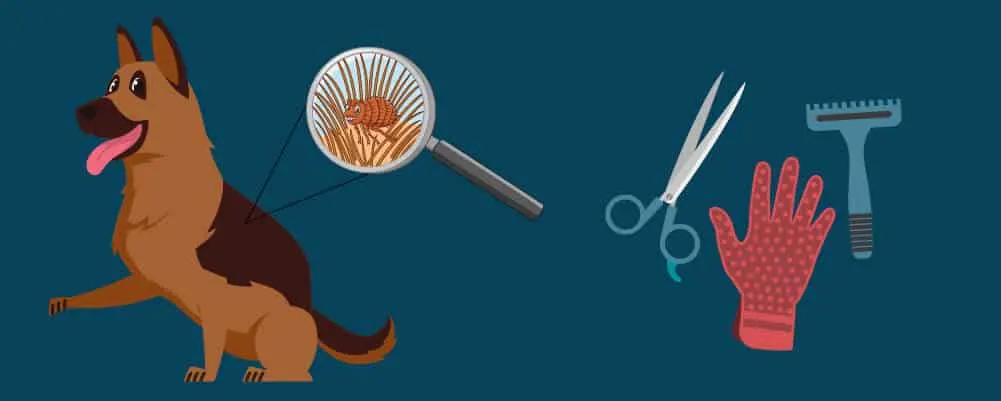
It’s very important to ensure that your pregnant bitch is protected against parasites and worms, both for the sake of the dog in question and the puppies.
In case you didn’t know already, worms can have a huge effect on your dog. Whether they’re hookworms, roundworms, coccidia or any other kind of worm, they will all sit inside of your dog’s intestines.
This can result in issues such as diarrhea, and a dog or a puppy can end up becoming dehydrated when they have worms.
They can cause some extra damage if they get into the dog’s lungs, and people can even be affected by hookworms and roundworms.
Certain other worms can also cause anemia, weight loss and an upset stomach.
It’s especially important to worm a pregnant dog. This helps to reduce the risk of them transferring intestinal parasites to their offspring.
Parasites can wreak havoc on a pregnant mother’s body as she becomes more stressed in the later stages of pregnancy. This can mean that she’s at greater risk of developing a huge parasite load.
This is bad for the puppies. The mother’s milk can end up transmitting worms to the puppy’s offspring.
If the puppies aren’t dewormed, the worms can take total control of your dog which has some pretty problematic effects, especially on very young dogs.
If you have been worming or giving treatment to your dog before pregnancy, it’s okay to continue. In fact it’s even encouraged, especially since worms and fleas can still be a problem even in pregnancy.
It can be quite risky for an expectant mother to have her energy drained by worms and fleas.
If you have just found out that your dog is expecting, you need to first figure out where they are in their worming and flea treatment schedule.
There’s a chance that you’re going to have to change the schedule based on their pregnancy. Alter the frequency and what kind of worming treatment that you use – your vet should be able to advise you on what to do.
Usually when it comes to worming a dog, you need to give them a large dose once every 12 weeks. This is slightly different when it comes to pregnant dogs. Before your dog gives birth, you should deworm them.
This should occur around 10 days beforehand. In addition to this, you should deworm her every three weeks after she has given birth if she is nursing the puppies, since this will stop her from giving the puppies parasites through the milk supply.
Don’t use any dewormers that aren’t safe for pregnant dogs.
Okay, so what about fleas and other parasites? This situation is a little different. You will need to apply a spot-on to your dog to help to reduce the risk of fleas.
These are usually safe to use in pregnancy but double check on the brand. If you have any doubts at all, it’s a good idea to speak to your vet for more advice.
Vets usually have prescription flea treatments that you can use that could be much better suited to your pregnant dog.
The moral of the story is to ensure that your pregnant dog is safe from any harm from the outside world like fleas, worms and parasites.
You should always speak to your vet before giving your dog any unknown medications that haven’t been approved already though, especially if your dog has any unexpected complications during her pregnancy.
It’s better to be safe than sorry.
Create a comfy space for your dog

One thing that you may notice is that your pregnant dog has started nesting. We’ve heard of this behavior in humans, and it’s basically the same thing in your dog.
They are creating a comfortable space for them and their puppies.
What Causes Nesting
First of all, it’s worth noting why your dog is trying to nest. It’s a natural behavior that you don’t need to worry about unless it gets overly obsessive.
It’s a very important part of trying to get your home ready for the puppies to arrive. Out in the wild, a pregnant bitch would find a spot that was hidden from any danger that was warm and sheltered enough for her pups.
Then they would try to hide it using things out in the wild like branches, brush, sticks and grass.
Since nesting is a maternal instinct, it’s a good idea to try and encourage it. You can do this by creating what is known as a ‘whelping box.’
It’s really important that you do this, since your dog may try to find their own place for whelping instead. This is a big problem, as your dog may choose somewhere that isn’t very safe or sterile for a birth.
You may struggle to get to her when she is whelping, and it could be dangerous.
The Whelping Box
When your dog is nearing her due date, you need to create a whelp box. Ideally this should be done a couple of times before it’s time for her to give birth.
Simply get a suitable box – make sure that there’s plenty of space in the box for your pregnant dog to stretch in. There should also be room in the box for all of the puppies.
The box should be easy for your dog to access and leave when necessary.
In order to keep the newborns inside of the box, you need to make sure that the sides are a couple of inches high. This also helps to ensure that droughts don’t end up getting into the area.
The whelping box should be put in a location that is both warm and quiet. It should be somewhere that your bitch feels safe and familiar.
You can usually build your own whelping box, but there are some that you can buy online.
You may also need to put a security bar around the surface inside of the box too if the breed is large, as it will help to ensure that your pups don’t end up being accidentally hurt in the box by the mother.
Your whelping box should have a few key characteristics. Namely, it should be dry and warm enough for your puppy with bedding that’s warm and soft.
The box should be easy to clean after your dog has given birth, and it should be waterproof. Make sure that the bedding cannot be easily ingested by puppies and ensure that it is free of any insects.
Consider any supplemental heat and ensure that it’s put in the right place – heat lamps, water filled heating pads and microwaveable heating pads can be useful.
Some puppy pads are good for lining the bottom of the box too.
If you prepare all of this in advance and take some time to get your dog used to the box, she should be comfortable and happy ahead of the birth.
Summary
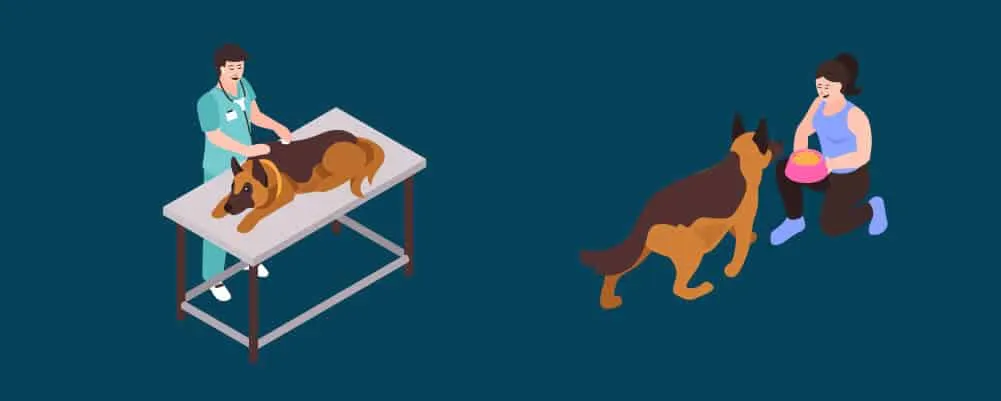
It can be both exciting and scary when your dog gives birth. There are so many different things to consider, and it can be rather daunting when you have to ensure that so many precious lives are safe.
Thankfully, you should have no problem with giving your dog a smooth pregnancy if you follow this guide. It’s time to be excited – a couple of extra paws will soon be joining your household.
Is there any better joy than that?

























